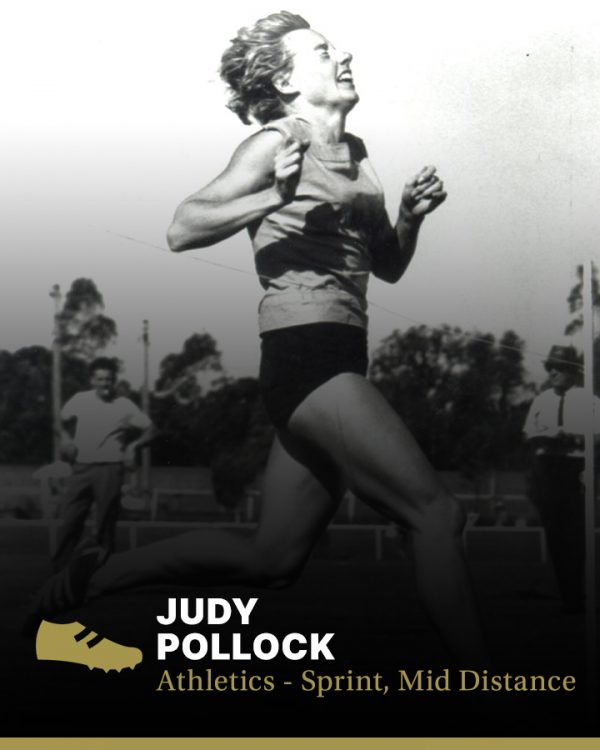Victorian runner Judy Pollock (nee Amoore) always ranked at the top of athletics despite many lay off’s and injuries, and she is one of the finest athletes Australia has ever seen.
Pollock first attracted attention when, as a nineteen year old physical education teacher she set a string of C grade records in inter-club athletics. She appeared at the 1960 Australian championships soon after, but illness ruined her performances.
In 1963, Pollock won her first state titles, the 220yds and 440yds and repeated these wins in 1964. Although she did not win the title at the Australian championships, good performances there and at subsequent Olympic trials, saw her selected for the 1964 Tokyo Olympics, where she ran extremely well in the 400m with a time of 53.4 seconds, winning bronze behind team mate Betty Cuthbert who won gold.
At the 1964/65 Australian championships in Perth, she won both the 440yds and the 880yds (2:09.3 seconds), establishing a new world record for the 440yds of 52.4 seconds. Then in March, 1965, she became the first woman ever to win all five flat races, the 100yds, 100m, 220yds, 440yds, and 880yds at the Victorian state championships. Later that year, on a tour of America, Judy set a world indoor record of 55.6 seconds in the 400m. She won both the 440yds (53.5 seconds) and the 880yds (2:11.7 seconds) national titles again in 1966/67. At the 1966 state titles, she recorded the second fastest 440yds in history behind her own world record and thirteen minutes later won the 110yds event. At the 1966 Kingston Commonwealth Games, she won gold in the 440yds (53 seconds) and silver in the 880yds (2:04.5 seconds), and finished fourth in the 220yds.
In mid-1967, during a European tour, she set the world 800m record of 2:02.0 seconds in Finland equalling the world 880yds mark, but officials left her in some doubt about the record being ratified when they advised her that the competitors’ singlets, which the organisers had provided for runners, bore a word under the number that was a coffee advertisement. For a while, Judy worried less about the record than the threat that she would be declared professional. Later that year she was the recipient of the famous Helms Award for Australasia.
Judy retired from athletics to start a family but returned to training soon after and to the surprise of most critics, was within 0.4 of the Olympic qualifying standard after only two inter-club 400m runs. Early in 1972 she won the national 800m title (2:01.5 seconds) and found herself selected for the 1968 Munich Olympics.
Unfortunately, just after the Olympic trials, she sustained a calf muscle injury and for a while it seemed as though she would be forced out of the team. Extensive medical examinations finally indicated that the injury was getting better so Pollock left with the team only to find the injury returning soon after her arrival in Munich. It became so bad that she was unable to compete at the Games. She ran again in November after nearly three months off but retired again in February 1973.
In November 1975, after nearly 21 months away from the athletics scene, she ran a 2:07.9 800m in a veterans’ race, and at 35 years of age began another comeback which saw her win the Australian 1500m title in 4:21.5 and finish second in the 800m to earn another Olympic berth, this time in Montreal. She made it to the semi-finals in the 800m with a time of 1:59.93 seconds.
At 36, Judy ran the fastest time of her career for 800m, 1:59.90 just missing a berth in the final. Also, she set an Australian record in the 1500m. She retired from international athletics in August 1976 to establish a training camp for junior athletes.
By 1985, Judy was back on track again, this time for the World Masters Games in Toronto. There she won gold in the 400m, 800m, 1500m, and 500m, setting world records in the first three. At the World Veterans Track and Field titles in 1987, she won gold in the 400m.





